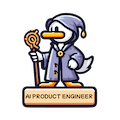🚀 AI's Wild Ride: From Transformers to Troubleshooting
Guten Tag, Ducktypers! Jens here, your friendly neighborhood software architect turned AI explorer. Today, we're diving deep into the nitty-gritty of AI development. Grab your debugging tools, because we're about to get our hands dirty!
🔧 Transformer Troubles: Looping Into the Future?

Let's kick things off with a hot topic in the transformer world. Remember last time when we talked about the Llama 3.2 release? Well, the AI community is buzzing about something even more intriguing: looped transformers.
A recent paper introduced the concept of looped transformers, claiming they can solve various arithmetic and algorithmic tasks. But here's the kicker: some in the community are skeptical about its novelty. They're saying it's not too different from Universal Transformers (UTs).
Now, as an engineer, I'm always interested in the practical implications. Here's a simplified pseudocode of how a looped transformer might work:
def looped_transformer(input, max_iterations):
state = initialize_state(input)
for i in range(max_iterations):
state = transformer_layer(state)
if termination_condition(state):
break
return stateBut here's where it gets tricky. The model needs to know the ground-truth iterations during training. It's like trying to solve a puzzle when you already know how many pieces you need – not exactly groundbreaking, is it?
What do you think, Ducktypers? Is this looped approach the next big thing in transformers, or are we just running in circles? Drop your thoughts in the comments – I'd love to hear your engineering perspective on this!
🧠 LLM Memory Magic: The Recurrent Revolution
Now, let's switch gears and talk about something that's been keeping me up at night (in a good way, of course). There's a fascinating theory floating around about how Large Language Models (LLMs) store information.
Traditionally, we thought the current text representation was the main driver in embedding outcomes. But hold onto your keyboards, because this might flip that idea on its head:
"There is substantially more recurrent information stored in embedding states within KV than previously considered."
In simpler terms, it's like your AI has a persistent memory that's more important than we thought. Here's a quick visualization of how this might work:
Input Text -> Embedding -> KV Cache
↑ |
|_____________|
(Recurrent Info)
This has huge implications for how we design and optimize our models. If this theory holds water, we might need to rethink our approach to fine-tuning and prompt engineering.
So, Ducktypers, put on your thinking caps. How could we leverage this recurrent information to build more efficient and effective LLMs? Share your ideas – let's brainstorm the future of AI memory together!
🔬 AI Research Rollercoaster: From Theory to Practice

Alright, let's zoom out and look at the bigger picture of AI research. We're seeing a shift from pure theory to practical applications, and it's changing the game.
Remember when we used to obsess over minimizing generalization error? Well, the focus is now shifting to reducing approximation error. It's like we've moved from building the perfect theoretical engine to actually making cars that people can drive.
Here's a quick comparison:
| Old Focus | New Focus |
|---|---|
| Generalization Error | Approximation Error |
| Regularization | Scaling Laws |
| Small Models | Large Language Models |
This shift is challenging some long-held beliefs in machine learning. For instance, the paper "Rethinking Conventional Wisdom in Machine Learning" suggests that certain regularization principles might not hold for large language models.
As an engineer, this excites me. It means we're moving from abstract concepts to real-world applications. But it also presents new challenges. How do we balance theoretical understanding with practical implementation?
I'm curious, Ducktypers. How are you adapting to this shift in your own work? Are you seeing the impact of these changes in your projects? Share your experiences – let's learn from each other!
🌐 Open-Source Odyssey: Navigating the Multimodal Maze

Now, let's talk about something close to my heart: open-source AI. As someone who's been in software engineering for years, I've always believed in the power of open-source. But in the AI world, we're facing some unique challenges.
The open-source community is lagging behind in adopting multimodal support. It's like we're still building bicycles while the big tech companies are launching rockets. This gap is particularly noticeable when it comes to vision capabilities in language models.
Here's a quick rundown of the situation:
- Big Tech: Releasing multimodal models like GPT-4V
- Open Source: Struggling to integrate vision capabilities
But all is not lost! There are ongoing efforts to bring multimodal support back to open-source projects. For instance, there's work being done to reintegrate multimodal support in the llama.cpp project.
As an engineer, I see this as both a challenge and an opportunity. How can we, as a community, catch up and even innovate in the multimodal space?
Here's where I need your input, Ducktypers. What roadblocks do you see in open-source multimodal development? How can we overcome them? Let's put our heads together and brainstorm some solutions!
💻 Code Conundrums: Real-World AI Engineering Challenges
Alright, fellow code wranglers, let's get down to the nitty-gritty. AI isn't just about fancy models and groundbreaking research – it's also about making things work in the real world. And boy, does that come with its own set of headaches!
Let's look at some common issues developers are facing:
-
NLTK Resource Errors: Ever run into the dreaded "Resource punkt not found" error? It's like trying to bake a cake and realizing you're out of eggs. Here's a quick fix:
import nltk nltk.download('punkt') -
Loading Fine-tuned Models: Getting your carefully crafted model onto a GPU can be trickier than it sounds. Here's a snippet to point you in the right direction:
model = AutoModelForCausalLM.from_pretrained( "path/to/your/model", device_map="auto", torch_dtype=torch.float16 ) -
Vector Search Optimization: When it comes to customer support, we're seeing some clever tricks. Storing questions in vector chunks and answers in metadata? That's some next-level thinking!
vector_db.add( vectors=encode_questions(data['questions']), metadata={"answer": data['answers']} )
These are just a few examples of the challenges we're facing. As an engineer, I find these problems fascinating. They're not just theoretical – they have real-world impacts on how we build and deploy AI systems.
Now, I want to hear from you, Ducktypers. What AI engineering challenges are you grappling with? Have you found any clever solutions? Share your war stories – let's learn from each other's triumphs and tribulations!
🎓 Wrapping Up: The AI Engineering Adventure Continues
As we reach the end of today's deep dive, it's clear that the world of AI engineering is as challenging as it is exciting. From the theoretical debates about transformer architectures to the practical hurdles of deployment, we're truly at the frontier of technology.
But remember, Ducktypers, every challenge is an opportunity for innovation. As we navigate this complex landscape, we're not just building AI systems – we're shaping the future of technology itself.
So, here's your homework (don't worry, I won't grade it):
- Reflect on the challenges we've discussed today. Which one resonates most with your work or interests?
- Think about how you might approach solving one of these problems. What strategies would you employ?
- Share your thoughts in the comments. Your perspective could be the spark that ignites the next big breakthrough!
Remember, the strength of our community lies in our diverse experiences and viewpoints. Your input is invaluable, whether you're a seasoned AI researcher or a curious newcomer.
Until next time, keep coding, keep questioning, and above all, keep quacking about AI! This is Jens, signing off from another episode of QuackChat: The DuckTypers' Daily AI Update. Auf Wiedersehen!


